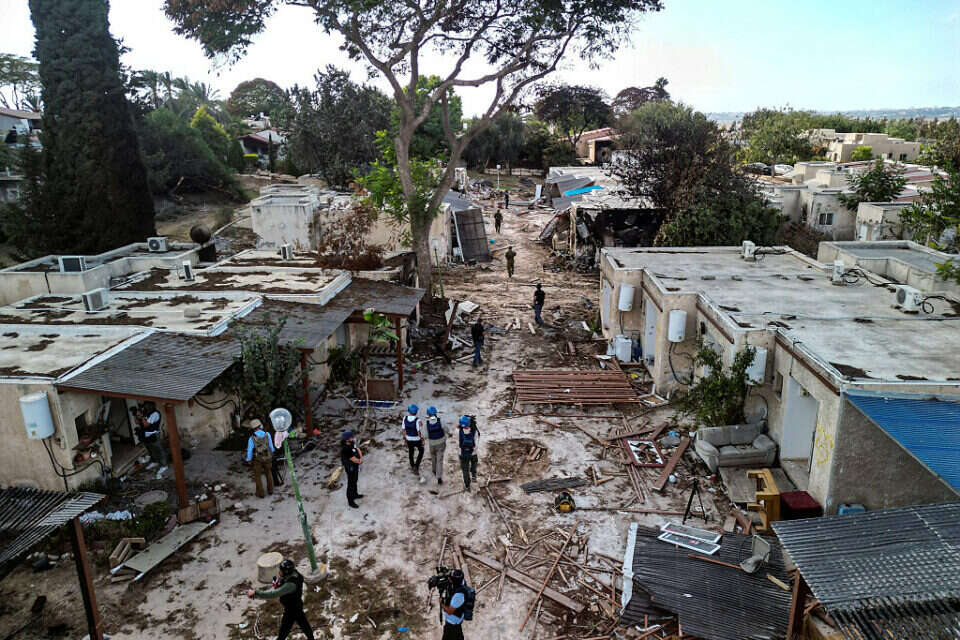He thought it was bullshit. He uses that word sitting in a room at the Gregorio Marañón Hospital in Madrid. It wasn't bullshit, it was covid. Álex Barreira was infected despite being 22 years old, practicing swimming, not smoking and not drinking. He spent a week "wrecked" with symptoms, believing that they would pass alone. “I wasn't expecting this or crazy, I thought nothing was wrong with me, that it was bullshit, a normal flu, a gastroenteritis, not this. Not this ", and raises his eyebrows:" But yes, it was coronavirus. " Now he is "sorry" for having endured so much, but like everyone, he says, "no one in their 20s ever thinks that something is going to happen to him."
He has not been seriously ill, he did have a fever that would not go away and that touched 40 degrees.
He has not needed oxygen, although he has a diagnosed bilateral pneumonia.
He is one of the 86,786 young people between 15 and 24 who have been infected in Madrid since the pandemic began, the age group that registers the highest accumulated incidence, each week, since last summer.
This, according to the latest epidemiological bulletin of the General Directorate of Public Health, is 311 cases per 100,000 inhabitants in the last 14 days.
"We were young and healthy and now we have the lives of older people"
He does not know with certainty where or how it was infected, although he has given it "a lot of thought." In Madrid, according to data from the Community, most of the outbreaks registered occur in the workplace, with 538 accumulated. But Alex doesn't work, yet. "I'm going to start in July, my first job," he says. Yes, it could be in one of the places that the Community collects as the second area with the most outbreaks, the social one, with 501. Or in the mixed call, with 264. Both are a drawer where you can enter from a wedding to bars or public transport .
Álex says that he uses the subway and the bus “a lot”, “practically several times every day”. Also that he goes swimming, "and there he swims without a mask." He has a driver's license and his teacher has a "habit" of drinking water every so often inside the car: "I take this into account because I know that he is infected and it is happening at home." When he goes out with his friends, they don't always find a terrace: "If it's all up outside, we go inside, although the places we go are never usually full." He sees his girlfriend a couple of days a week, he lives with his family in Vicálvaro.
He narrates everything now with a certain calm, sometimes with a smile. But his face changes if he is asked about the moment when they told him that he was infected, that he had pneumonia and that he had to stay in the hospital: “I collapsed, really. My mother and grandmother called me and I had to collapse. It was the shock, and having to stay here. The first night was spent in observation to see how it evolved and prefers not to repeat the experience: “Like me, there were more people, more sick. I couldn't sleep, it was impossible, and I put on my headphones to see if the music could evade me ”. The next day they transferred him to the plant. It was last Thursday. El Marañón has 79 covid patients, "nine of them have between 20 and just over 30, at least one of them in the ICU," says a spokesperson for the center.
The Gregorio Marañón hospital has 79 patients admitted for covid, nine of them have not yet reached 35, one is in the ICU
"I knew almost certainly that in an [intensive care unit] I was not going to end, because I am young and I do sports," he recalls. But he also remembers that “well, he was not there”: “It was not normal for him to walk as if he had been digging ditches for 12 hours, very tired and with a high fever, he flooded the sheets”. And the sadness is not forgotten: "Especially the first days of being here." Something that last summer, with the same diagnosis, did not happen. The pulmonologist who treats him, Rosa Gómez, explains: “He was also diagnosed with bilateral pneumonia, but when he tested negative for covid, he passed it at home. Now, in the first antigen test it was negative, but positive in the PCR, and he was admitted with a picture similar to that of covid patients, fatigue, asthenia, fever ... He also has digestive problems, which we cannot link to the coronavirus. "
The evolution of the disease in Álex will be the same as in any other patient, says the specialist.
He will spend the same days on average in the center as someone who is 20, 30 years older.
"It is true that older people experience functional decline, which makes them have to stay longer for recovery," he says.
After the virus
And then? Because afterwards is what Alex was most afraid of: "If it was going to affect the rest of my life, but they told me that in principle I would return to normal, I was suffering because of that, in case that did not happen." Gómez confirms that his evolution is good, that the affectation is not very great, so he does not believe that there may be sequelae in the lungs or in the rest of the organs. In young people, he adds, “there are certain aspects of recovery that are spectacular, such as saturation, but like the rest, the liver profile is also altered [liver cells can be damaged], or the enzymes of the pancreas, sometimes coagulation ”.
Also remember that, in any case, "you can never predict who may have sequelae."
And it's not just the aftermath.
In Spain there are more than 350,000 people with persistent covid, a syndrome characterized by the persistence of symptoms of covid-19 weeks or months after the initial infection, or by the appearance of symptoms after a time without them, as defined the Ministry of Health.
In Madrid, there are at least 70,000, and many of them have not reached 35.
We can not stay home all day, but when you go out you should not forget your head at home
Alex, sitting on the edge of the bed, leans forward. He is thinking about how to say what he is going to say: “I'm glad I got it; I mean myself and not my family ”. His grandmother now lives with them, at home there is no space for each of them to have theirs, so he sometimes sleeps with his mother, who is asthmatic. He wonders about what would have happened if he had infected them. Or his brother, or his father.
What he has also given some return to is the parties he has seen, especially on TV and social networks.
"We can't stay home all day long, but when you go out you don't have to forget your head at home."
He says he does not understand "what a fool does not understand" that a spree could be the death of his grandmother, or the grandmother of a friend.
“When this is over, in a year or two, because it won't last 20, you can go and dance and everyone is so happy.
In the meantime, they don't come to me with bullshit that what you have to do is have a good time, there are things that no matter how much we want to, are not necessary ”.
What influences young people to comply with the measures?
The older, the more compliance with the measurements, is what the linear prediction of the first report Social Perception of Scientific Aspects of Covid-19 from the Spanish Foundation for Science and Technology says last year. One of its authors, the sociologist Pep Lobera, published this Saturday an analysis in the Public Agenda on young people and compliance with the measures against the virus in which he indicates that it is convenient "not to generalize", because neither "are all young people, nor only the young people ”who relax in front of the protocols. Lobera identifies five issues that can cause this relaxation.
Perception of risk.
It is different between age groups, he wrote.
“We know from epidemiological studies that age is the fundamental risk factor.
Young people, therefore, generally perceive that they are individually exposed to a lower risk than their elders ”.
And he added vaccination as a factor for "reducing the perception of risk in general", even for those who have not yet been vaccinated.
The cost when complying with the measures.
Lobera explains that they are not the same for everyone and that "permanent compliance with all the recommendations entails very high socialization costs for some young people" that can affect their mental health.
In order to reduce these costs, he proposes that they be offered "safe, open-air" socialization alternatives.
The behavior of the immediate social environment.
"Individuals are strongly influenced by the behavior that develops around them" and it is "less likely to act preventively in contexts where it is perceived that these precautions are taken less frequently", explained the sociologist in the analysis.
Trust in health and scientific institutions.
The politicization that has been made from the institutions of the pandemic "has eroded that trust of different social groups in decision-makers and, as a consequence, in health prevention recommendations," said the sociologist.
The conspiratorial mentality.
Lobera recalls that "it is gaining influence when it comes to explaining compliance with prevention measures, as well as benefiting from vaccine rejection."
Rosa Gómez, pulmonologist at Gregorio Marañón, “emphasizes that the state of alarm has ended, but each person has to take control”.
He agrees with Lobera's analysis in that individually responsibility counts: “You don't have to shut yourself up to do things well.
It is enough to know where you can stay, how long and with what measures.
I think you have to give more information and insist more on the places where you have a greater probability of contagion ”.
That where they are indoors, above all, poorly ventilated.
Subscribe here
to our new newsletter about Madrid




/cloudfront-eu-central-1.images.arcpublishing.com/prisa/ER2D3J6IDZDC3M6454S36Q6GCI.jpg)




